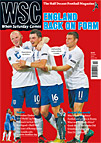 Matt Nation enjoyed a tournament with 1,500 teams from 60 countries, but was disturbed by the precocious antics on show
Matt Nation enjoyed a tournament with 1,500 teams from 60 countries, but was disturbed by the precocious antics on show
After a month of the corporate-heavy stodge served up in South Africa, the 2010 Gothia Cup appeared to be just the right sort of light and fluffy dessert to cleanse the football tournament attendee’s palate. In the world’s largest youth team competition, many games took place on what looked like an expanse of waste ground converted into astroturf pitches in the heart of Gothenburg (there was some talk of the playing surface being “the best astroturf in the world”, but only in the same unfounded way as Danish-brewed lagers and English top-flight football are touted as being peerless).
The drinks were cheap and served in trademark-free paper cups. Vuvuzelas were present and correct, but only as silent accessories, like studded leather wristbands at a heavy metal concert. Off-field entertainment included a freestyle ball-juggler whose suppleness and ball-eye coordination could have landed him a prime role in a Gerry Anderson film. Even the spectacle of minors warbling We Are The World at the opening ceremony – an event that, in any other setting, really ought to have prompted an inquiry from the Swedish social services – was just the clean side of vomit-inducing.
Regrettably, some of the un-World Cupness evaporated as soon as the football started. This had less to do with the quality of the football played – an English Under-15 team’s central defenders showed infinitely more poise and positional sense against a German side than certain fellow countrymen had demonstrated in a similar fixture a few weeks previously – and more to do with the precociousness of it all.
Things may have become metrogenerational, 40 may be the new 21 and nobody may bat an eyelid at grandfathers sporting nipple-magnifying T-shirts and iridescent jeans with the name of an outdoor activity spread across their backside. But it doesn’t work the other way round. Children behaving as adults is unsettling. Big would never have been a box-office success if Tom Hanks had played a 12-year-old pretending to be 30. Like Oskar in Günter Grass’s The Tin Drum, he’d have simply frightened the living daylights out of people.
The prematureness wasn’t quite as scary at the Gothia Cup, but it was irritating to a degree not attained since William Hague opened his mouth at the Tory party conference in 1977. Goalscorers not yet out of primary school were kissing wedding rings they weren’t wearing and rocking imaginary new-born babies to sleep.
Assists, however accidental or involuntary, were celebrated by 11-year-olds running over to their coach and jumping into his arms. Parched teenagers stood six inches from their parents, did an exasperated impersonation of Paul Merson celebrating a goal, slaked their thirst and then hurled the bottle at adults’ feet without a word of thanks. And Year Six pupils who think that joining hands, gurning and performing a Mexican wave is going to garner applause should maybe hang up their garish boots and persuade Miss to organise a stage version of Bugsy Malone for next term’s school play.
The solution doesn’t lie in yet again admonishing professional footballers for not being role models. Most children won’t want to start smoking, urinating in the street or getting pleasured in the back of minicabs simply because famous men their fathers’ age do. It’s more a question of putting to the test the theory that play is simply a prelude to work. Most of these kids are going to have to go to work as something other than a professional footballer. And if, at work, you embrace your superior for having a job well done, sooner or later you’re going to have your colleagues slipping the company laptop into your bag when you’re not looking and then tipping security a wink shortly before knocking-off time. If you throw bottles at people, the local constabulary will be round your house wanting a word. If you gesture for plaudits in front of people who neither sired nor bore you, you’re going to get gestures in return, but maybe not quite as reciprocally as you’d imagined.
Of course, it’s too late to stop the horseplay that’s permeated the grown-up game. However, it’s not too late to do something about the next generation. In several countries, Under-12s play a different game anyway – fewer players on a smaller pitch with a lighter ball – so it wouldn’t be out of place to tweak the rules a little, too. Referees could be given special dispensation to apply some of the common sense that’s regularly cried out for and simply send children off for “age-inappropriate behaviour”.
Drink water and then spit it out without swallowing any – you’re off. Contort your face and thump yourself because you stumbled over your own feet in the opponents’ box and the referee fell for it – you’re off. Take your shirt off and start windmilling it around like Joan Crawford after one bathtub gin too many, simply because you, rather than one of your mates, got the finishing touch – you’re off. And you leave the field with your arms spread and a hard-done-by look on your face, you’ll be suspended for six months and all.
If that sounds a trifle daddish, then all the better. Daddishness is what men of my age do. If anybody’s going to wag their fingers, it’s us, not paper boys and Saturday lads – however good their goal was.
From WSC 284 October 2010